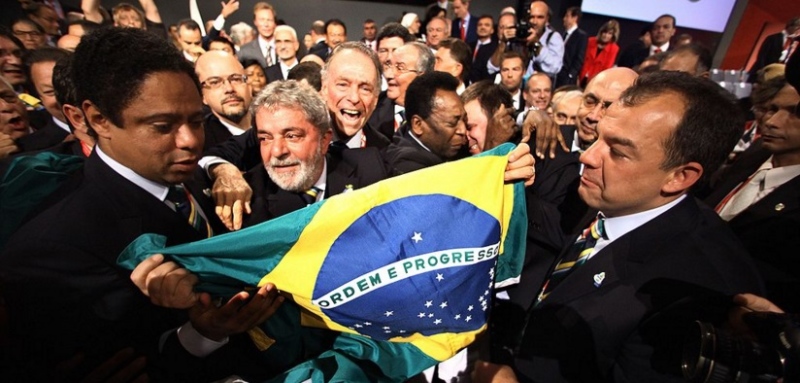Latin America Advisor
A Daily Publication of The Dialogue
Will Embattled Brazil Be Ready for the Olympics?

Brazil, which is in the grips of its worst recession in decades and where President Dilma Rousseff is facing an impeachment attempt, is scheduled to host the Summer Olympics later this year. What does Brazil need to do to get ready to host the games? Will it be ready? What will be the economic impact for Brazil of hosting the Olympics?
Joel Korn, president of WKI Brasil and senior international partner at UPITE Consulting Services: "Despite the current difficult political and economic environment, Brazil is positioned to make the Summer Olympics a stunning success. Everything that is under the control of the different entities involved, particularly the Rio 2016 Organizing Committee and the Municipality of Rio de Janeiro, is being carried out on schedule with strong discipline and commitment to excel. Approximately 80 percent of the construction work required at the different venues is completed. The city is going through major and important public works, including critical transportation improvements through the expansion of the subway system and delivery of trains. Budget execution within available resources has imposed a hierarchy of priorities, but this will not impair the core activities and quality of services, particularly security. In contrast to the country’s outlook of continued economic recession in 2016, the city of Rio de Janeiro stands as a major beneficiary of critical infrastructure work and private sector investments in anticipation of the Olympics. Unlike the 2014 World Cup, when there was an undue emphasis on construction of new stadiums, some of them in cities of limited demand, the Olympic Games will leave an important legacy and contribution for the city. It is worth mentioning the creation of new public schools, significantly enhanced transportation and freeways, modernization of the port area including new museums, expanded areas for leisure and sports. Brazilians’ warm hospitality and the positive vibes associated with the privilege of hosting the Games will go a long way in contributing for a memorable event. It is an opportunity to restore self-esteem at a moment of significant challenges."
Ben Supple, associate vice president at the The Cohen Group: “In 2009, Brazil aggressively sought the rights to the host the 2016 Olympics, eager to showcase Rio in the global spotlight. Its economy was strong with GDP growth consistently above 5 percent, FDI was on the rise and Lula was convinced that 2016 was Brazil’s Olympic moment, a point of pride to be shared by all of South America. Sadly, months before the opening ceremonies, the games have become almost an afterthought, as the Rousseff administration fights for its survival amid the greatest economic downturn in a generation. Only 50 percent of domestic tickets have been sold, compounding budget shortfalls with no time to spare. While Olympic planners insist that major infrastructure projects are on schedule (even if only by a hair), many service contracts have been delayed, and Rio 2016 has had to diverge from models used by London and other host cities. As one example, venue perimeter security will be provided by an estimated 85,000 military and security personnel, as critical electronic security systems were not designed on time or up to standard. All that being said, Rio specializes in delivering big events, from the PanAm Games to the World Cup to Carnaval, so it is likely to rise to the occasion again. Mayor Paes and Olympic Committee CEO Sidney Levy are highly competent leaders who understand the high stakes involved. All Olympic Games have glitches and receive skeptical press in the months before show time, and Rio 2016 will be no exception. However, the Olympics have a special power to breathe new life into the heart and soul of a country, and it could not come at a more critical time for Brazil.”
Peter Sufrin, independent Washington-based analyst: “Brazil will encounter many challenges along the way to hosting the Olympics. Awarded the Games in 2009 when its economy was booming, Brazil now faces a much less favorable policy picture. Indeed, chronic recession, the Petrobras scandal, threats of Dilma’s impeachment, stagflation and a weak real will all have negative implications for Olympic planning. Brazil is at a crossroads, what Peter Hakim of the Dialogue terms a ‘moment of uncertainty’ in politics and economy, underscoring the Brazilian populace’s general lack of faith in governance. Olympic planners still face many lingering problems, among them, sanitation. Guanabara Bay, the intended site of the sailing and rowing competitions, is significantly polluted with sewage, a major concern of the International Olympic Committee. On another note, the economic impact of the Games will affect Brazilians in several ways. The construction of a bus rapid transit line, improved highway, subway and sanitation should all have decidedly positive implications. Furthermore, just as Brazil ultimately finished stadium construction to host the World Cup in 2014, many of the Olympic facilities for the summer of 2016 have already been completed. While these developments are admirable, they will not help to diminish the ongoing problem of Rio’s gap between rich and poor. The costs and benefits of the Games remain a work in progress. International attention will not cure Brazil’s political and economic maladies, but could provide a temporary boost to the nation’s image abroad. One can only hope that the Olympic plans will proceed apace with a positive outcome.”
The Latin America Advisor features Q&A from leaders in politics, economics, and finance every business day. It is available to members of the Dialogue's Corporate Program and others by subscription.



















